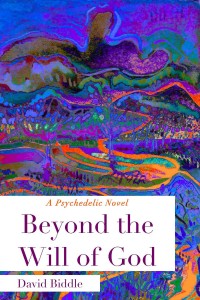
My novel, Beyond the Will of God, is now posted at NoiseTrade.com, an amazing website that lets artists offer their music and books to people for free. You can find all sorts of weird and amazing leading edge work at that site offered by everyone from 17-year-old guitar geniuses to hard-to-categorize 56-year-old psychedelic novelists writing for uncompromising lovers of music and weird ideas.
Beyond the Will of God was published on July 4, 2012. It’s been downloaded over 10,000 times from Amazon and even won the Indie Book-of-the-Month Award at WriteReadRate.com (sadly, now defunct). If you go to the NoiseTrade page for the book you’ll find some excellent quotes by respected reviewers. BWG is all about the mystical, spiritual, magical world of hallucinogens and music, but it’s also supposed to be highly amusing.
I wrote Beyond the Will primarily as an allegory to get at what are essentially the unsayable mysteries of the mind and the power of music. As with music, a good story should bounce around in the head. Music and words are first and foremost vibrations. Music travels through the air into the mind. Stories travel by light through the eyes and then into the mind. Music and beat are all about the human soul. They tether us to time and the universe of emotions. Stories (usually told in words) connect us to what is possible but still a mystery. Stories are always about the power of mystery, and good ones bounce around in your head for weeks after you finish them. BWG is intended to do that in a big way.

BWG is also supposed to be funny. Readers haven’t commented on that much. The book makes extreme fun of all sorts of conspiracy theories that rose up during the 1970s and 1980s — some quite literally true, others quite literally bizarre and hard to believe. The CIA did indeed experiment with hallucinogenic drugs on unwitting citizens; those experiments were connected to a broader set of psychological studies that included something called remote viewing; myths popped up all over the country about mysterious black helicopters; and militia groups formed little pockets of paranoia throughout the plains states. Elvis was sighted everywhere back in the late 1970s. And, people have also always wondered if our great cultural heroes who died before their time faked their own deaths.
The ’70s were also all about the rise of the tabloid media, and fanning the flames of misinformation to make a profit off the public. Talk radio was on the rise back then as well. Big New Age concepts were being thrown around all over the place — pyramid healing, clairvoyance, channeling past lives, etc. Drugs seemed to be a gateway into a realm of happiness, or at least magic (they do now, too, of course).
Beyond the Will of God plays with all of those issues. It also plays with questions about the death of Jesse James and bluesman Robert Johnson. And it legitimately addresses the mechanics of telepathy. It surprises me that no one has picked up on how Beyond the Will looks at reading other people’s minds. Think about it: if telepathy were possible, it would be so messy and complicated. If you heard someone else’s thoughts in your mind, what would they sound like? How would you distinguish another’s mind from your own? And how would you be able to make a distinction between several different people’s ideas?
 This story was written under the influence of a lot of different kinds of fiction — Tony Hillerman mysteries; W.P. Kinsella’s Shoeless Joe (which became the movie Field of Dreams); Carlos Castaneda’s Yaqui sorcerer books (which we learned was a kind of fiction back in the mid-’70s); the irreverent psycho-philosophical comedies of Tom Robbins, especially Half Asleep in Frog Pajamas.
This story was written under the influence of a lot of different kinds of fiction — Tony Hillerman mysteries; W.P. Kinsella’s Shoeless Joe (which became the movie Field of Dreams); Carlos Castaneda’s Yaqui sorcerer books (which we learned was a kind of fiction back in the mid-’70s); the irreverent psycho-philosophical comedies of Tom Robbins, especially Half Asleep in Frog Pajamas.
We came through a lot in the ’60s and ’70s. Those were heady times. We started to ask a whole lotta stupidly enormous questions. But we didn’t ask enough, and we tended to jump at the first answer to things rather than waiting to see if other questions might make those answers superfluous. We were playing with a big box of questions there. Sometime in the mid-1980s that box got closed up and someone put it away. Beyond the Will of God pulls the box back out and reminds the reader that it’s okay to start asking again. After all, most of us who were alive back then are going to be dead soon enough. Isn’t it time you stopped acting like you have your shit together? You don’t. No one does.
Go to NoiseTrade and download the book now so you can see what I’m talking about. What have you got to lose? It’s free. You can also buy it as a paperback at Amazon or Barnes & Noble.
Happy reading this summer. Go Phillies!



